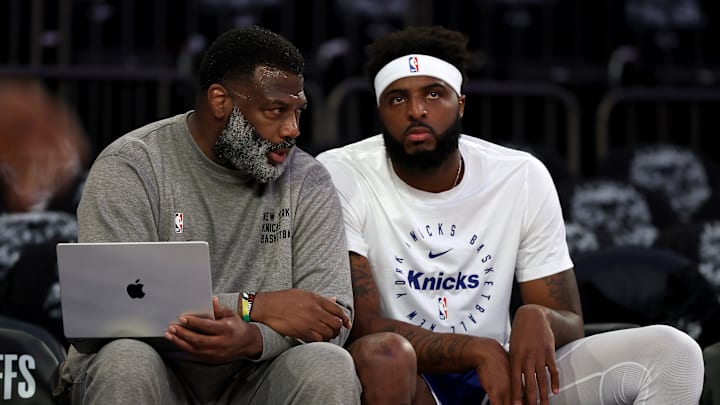Mitchell Robinson has one of the most team-friendly contracts in the NBA. The front-loaded four-year, $60 million deal that he signed in 2022 has afforded the New York Knicks remarkable flexibility in their efforts to build a championship-caliber roster.
As Robinson's prepares for the final season on his current contract, however, the Knicks must decide if his value is greatest on the court or on the trading block.
Robinson's 2025-26 cap hit of $12,954,546 will consume just 8.38 percent of the salary cap. That minimal cost is invaluable to a Knicks team that will pay a combined $172,027,471 to OG Anunoby, Mikal Bridges, Jalen Brunson, Josh Hart, and Karl-Anthony Towns next season.
As such, it could be perceived as reckless for the Knicks to trade Robinson when affordable depth is so difficult to come by.
Furthermore, Robinson is the Knicks' best interior defender and offensive rebounder. Losing him would entail parting with a player who can help offset some of the well-documented concerns with Towns' defensive inconsistency at a time when interior depth is tough to come by.
Unfortunately, the Knicks can't afford to evaluate this situation through an exclusively positive lens. To make the best possible decision for the team, they must evaluate it from every angle.
Mitchell Robinson's contract year poses question: Trade, extend, or wait?
Robinson's talent should make this decision simple enough: Sign him to an extension and continue to reap the benefits of his presence on the roster. Unfortunately, there's a factor that must be valued in equal measure: Availability.
Since 2022-23, Robinson has appeared in just 107 of the Knicks' 246 regular-season games—the ultimate reason to press pause on enthusiasm.
Robinson appeared in 59 games in 2022-23, 31 in 2023-24, and 17 in 2024-25. He fractured his left ankle in December of 2023, and although he returned by the end of the season, he suffered a sprain and an aggravation that precipitated offseason surgery.
That caused Robinson to miss 65 games in 2024-25, which could act as a valid reason for New York to look past his most recent campaigns, but re-signing Robinson would be a risky investment nonetheless.
The other option for the Knicks is perhaps the riskiest: Allowing Robinson to play out the remainder of his contract. New York is in a prime position to offer him an opportunity to start for a contender, and has built enough equity with the big man over the past seven seasons to believe it can re-sign him.
Robinson will be an unrestricted free agent in 2026 if he isn't signed to an extension, however, which creates the inevitable risk of New York losing him to another team and getting nothing in return.
Facing a predicament that seemingly lacks a definitive right answer, the Knicks are officially in dangerous territory. They could regret extending Robinson if his injury issues persist, rue the day they let him enter unrestricted free agency if he signs elsewhere, or find that trading him was the wrong decision if he excels in another uniform.
There's no easy answer to the Knicks' current predicament, but if Leon Rose is going to make the most of this offseason, he'll need to determine if Robinson is more valuable on the court or in a trade.
